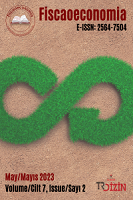Osmanlı Toplumunda Batı Karşıtlığının Yükselişi: İktisadi, Siyasi ve Sosyal Temeller
The Rise of Anti-Westernism in the Ottoman Society: Economical, Political and Social Foundations
Author(s): Bahadır NurolSubject(s): National Economy, Economic history, Economic policy, Social Theory, The Ottoman Empire, Socio-Economic Research
Published by: Ahmet Arif Eren
Keywords: Anti-Westernism; Tanzimat; Ottoman Economy; 1908 Revolution; Union and Progress; Cosmopolitanism;
Summary/Abstract: It is possible to read the last two hundred years of the Ottoman Empire as a history of Westernization. This period of time includes efforts to imitate, and in some respects, embrace the West. There are periods, however, in Ottoman history when anti-Westernism is at the forefront. The aim of this paper is to identify these periods of hostility and the socio-economic and political developments that underlie them. Anti-Westernism in the Ottoman era resembles waves that were sometimes defeated and withdrawn, remained cynical for a long time, but sometimes became extremely powerful. The rise of the waves was related to the social, political, and economic context in which the society is embedded. This paper claims that there are three periods in Ottoman history when the waves reach their peak. The first wave refers to the reactions following the Tulip Era, which witnessed the first and timid steps of Westernization. The second crystallized in the reactions that followed the Tanzimat, the most comprehensive Westernization move in Ottoman history. Once capitalism had entered the Ottoman lands, it also became possible to associate the anti-Westernism of the period with the disillusionment with economic policies. The third great wave corresponds to the nationalist counter-current that followed the 1908 revolution, the last major cosmopolitan breakthrough in Ottoman history, and rose until the collapse of the empire. This wave rose with the Tripoli and Balkan Wars and reached its peak with the First World War. Disappointment and anger emerged with the loss of the Balkans and the rising trend of Turkism. This opposition is accompanied by protectionist policies in the economic field. The study brings together data from three different fields; economics, history and sociology.
Journal: Fiscaoeconomia
- Issue Year: 7/2023
- Issue No: 2
- Page Range: 1647-1673
- Page Count: 27
- Language: Turkish

